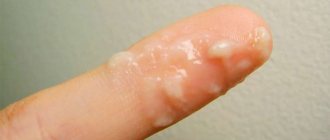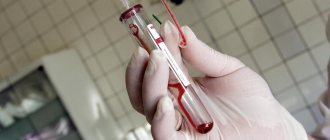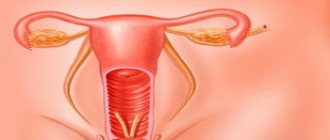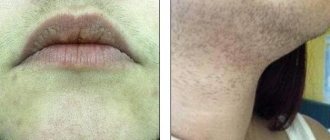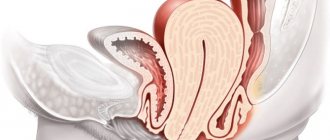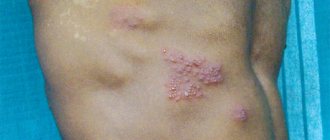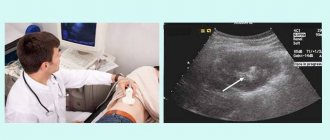Lack of menstruation is often the first sign of pregnancy. The second completely natural reason for this condition is breastfeeding. But often such a symptom can be caused by other factors, of which there are quite a few. If we are not talking about pregnancy or breastfeeding, menstrual irregularities, prolonged or complete absence of menstruation indicate pathological processes occurring in the female body that need to be identified and eliminated.
In medicine, the absence of menstruation is called “ amenorrhea ”. It comes in two main types:
- Primary amenorrhea is the absence of menstruation in girls who have reached puberty. To be more precise, in this case menstruation did not stop, it never began;
- secondary amenorrhea will be discussed if menstruation is absent for more than six months. Unlike the primary form of this disorder, menstruation did occur at least once, but very often the pathology is observed in women whose menstrual cycle was previously completely normal and regular.
Amenorrhea can be ovulatory or anovulatory. This takes into account the connection between the presence or absence of ovulation, that is, the release of a mature egg from the follicle.
What is hormonal imbalance
When there is a hormonal imbalance in the body, hormone function is disrupted. In the female body, the main hormones are progesterone and estrogen, they are responsible for health, puberty, menstruation and the functioning of the reproductive system.
Normally, hormones have an established balance that maintains the functions of all organs at the correct level. If any hormone shifts up or down, a woman immediately feels it on her health.
Hormonal imbalance in women, the causes of which have a wide range, can appear at any age.
Symptoms of disorders in women after 30 and 35 years
Signs of hormonal imbalance after thirty to thirty-five years appear as:
- Menstrual irregularities. Any change in MC, if it continues for two or more cycles, should suggest a hormonal imbalance and the need to contact a gynecologist. Depending on which hormone is secreted insufficiently or excessively, menstruation may vary as follows:
- excess estrogen - rare but heavy menstruation;
- lack of estrogen - rare scanty periods, sometimes their complete absence (oligomenorrhea or amenorrhea);
- lack of progesterone - painful menstruation and prolonged painful menstrual bleeding, intermenstrual bleeding;
- excess progesterone - MC disorders can be of a different nature, but these are serious disorders that require a full examination to exclude a malignant tumor;
- excess androgens (male sex hormones) - they suppress the secretion of estrogen, so changes in MC will be the same as with a lack of estrogen;
- excess of the pituitary hormone prolactin – menstruation is rare and scanty; Normally, prolactin stimulates the secretion of human milk; with its increased secretion, the MC is disrupted, since it suppresses the maturation of the egg in the ovary, the secretion of FSH and estrogens; With such a failure, pregnancy is impossible.
- Changes in the central nervous system. Symptoms of hormonal imbalance: chronic fatigue, drowsiness during the day and insomnia at night, disturbances in body temperature, mood swings (irritability, tearfulness, unjustified aggression).
- Changes in the autonomic nervous system, symptoms: changes in blood pressure (BP), accompanied by dizziness and headaches, attacks of increased heart rate, prolonged aching pain in the heart, etc.
- Changes in the mammary glands: with an excess of estrogen, fibrocystic mastopathy develops, which sometimes (in rare cases) turns into cancer.
- Changes in the endocrine organs. Excess androgens can lead to changes in body contours according to the male type: the outline of the figure changes, hair growth changes, and even a deepening of the voice. Excess androgens require exclusion of a tumor process.
The effect of the disease on the body
A hormonal disorder is considered to be uncoordinated work of the endocrine and neuroregulatory systems. As a result, the body is in a pathological state with pronounced symptoms of failure. Violations can be observed not only in women, but also in men.
It should be remembered that human health primarily depends on hormonal levels.
In the case of unstable work, a sharp deterioration in health is observed, which affects not only the internal organs, but also the appearance.
Hormonal imbalance in women is caused by disturbances in the endocrine system
The female body is most susceptible to disruptions due to disruptions in the reproductive system. The girl’s genitourinary system reacts sharply to the slightest infections and hypothermia, which leads to inflammation, which leads to hormonal imbalance. As a result, immunity decreases, menstruation disappears, and a number of other problems appear.
The insidiousness of this malfunction is that in the first stages in women and men the disease occurs without a single symptom. For these purposes, regular checks, tests and monitoring by a doctor are prescribed in order to detect an imbalance in time.
Reasons for violations
The causes of hormonal imbalance can be different, it all depends on the influence of external factors and the general condition of the body:
- heavy mental and physical stress, prolonged stress;
- sudden increase or loss of body weight; extreme diets, malnutrition, irregular meals, as well as overeating due to stress, etc.
- severe infections, operations, cancer, chronic diseases with frequent relapses;
- diseases of the uterus, ovaries, thyroid gland, adrenal glands;
- long-term self-administration of COCs (combined oral contraceptives); doctors select COCs after examination and recommend taking breaks after some time, switching to barrier contraceptives;
- frequent use of contraceptives for emergency prevention of pregnancy is a real blow to the reproductive system;
- long-term uncontrolled use of drugs from the group of glucocorticoids;
- changes after childbirth, especially if they were difficult;
- changes after abortion are another blow to the reproductive system;
- any uncompensated endocrine diseases: the work of all endocrine glands is interconnected;
- liver and kidney diseases: hormones are decomposed in the liver, and their metabolites are excreted through the kidneys;
- hereditary features of the structure and functioning of the reproductive system: a woman after 35 years of age may experience ovarian depletion if she runs out of eggs; this leads to the development of early menopause.
Video about hormonal disorders in a woman:
Causes of hormonal imbalance
Hormonal imbalance in women, the causes of which can be clarified by a gynecologist, can be caused by the following situations:
- Pathologies from birth. If a girl was born without genitals or partially formed ones, then in the future there is a risk of an imbalance in hormones.
- Puberty period. At this time, the body undergoes a complete restructuring, so disruptions in the functioning of the endocrine system are often observed. Puberty not only shapes a girl’s organs, but also changes her appearance. The figure begins to change, smooth curves of the waist appear, hips widen, and in some cases the girl suddenly gains weight. At this time, menstruation appears, which indicates readiness to become a mother. In adolescence, irregular critical days are the norm; a certain cycle is established by the age of 18, and for some only after the birth of a child.
- Disturbances of the endocrine system. Signs of malfunction of the peripheral glands are: infections, inflammatory processes, tumors of various types.
- Disruptions at the neuroendocrine level. In this case, hormones cease to be produced or are partially produced. The cause may be: head injuries, encephalitis infection, cancer.
- Pathologies of the adrenal glands. Due to disruptions in their work, the process of removing metabolites is reduced.
- Treatment and administration of hormonal drugs. Hormonal imbalances can be caused by a number of medications. Failures can also occur in cases where the doctor himself prescribed medications. Often a woman fails by taking birth control pills. This outcome occurs when a girl chooses a remedy without consulting a doctor.
- Frequent stress. Constant overexertion and stress negatively affect the quality of functioning of the endocrine glands. Prolonged stress destroys the cells of the nervous system, which is directly related to the endocrine sphere and the production of hormones.
- Lifestyle. In order to maintain your health, you need to exercise, not drink alcohol, and stop smoking. Otherwise, a huge load falls on the body, fatigue, nervousness, and depression appear. Lack of activity and poor nutrition also cause hormonal imbalance. Sudden weight gain affects the functioning of the endocrine system. Refusal of food and diet leads to vitamin deficiency and further exhaustion. If a girl has lost more than 10 kg, her periods disappear, and doctors will have to spend a lot of time restoring them.
- Addiction to alcohol and drugs. Alcoholic drinks and drugs are considered one of the main causes of serious diseases. The female body is more susceptible to alcoholism than the male body. As a result, a number of problems appear: premature aging, liver destruction, endocrine diseases. It should be remembered that deviations in the functioning of the organ also entail hormonal disorders.
- Gynecological diseases. Diseases of the uterus and ovaries often lead to hormonal imbalances. This effect may be the result of unsuccessful surgery on the organs of the reproductive system.
- Artificial termination of pregnancy. Abortion is a procedure that brings enormous stress to a woman’s body. Hormonal imbalance is a common consequence of abortion. Women who terminate a late pregnancy are primarily at risk. Signs of hormonal imbalance include sudden weight gain, mood swings, increased sweating, and surges in blood pressure.
- The period of gestation and birth of a child. The first signs of changes in the body are observed after fertilization.
Throughout pregnancy, a woman's hormonal levels are unstable. This causes mood swings, fatigue, and anxiety. Under the influence of hormones, menstrual periods stop, body weight increases, and breasts grow. In some cases, unwanted body hair may appear. Imbalance after childbirth is associated with gynecological problems, stress, inflammatory and infectious diseases. - Climax. Menopause occurs in the life of every woman and is characterized by a gradual decline in the function of the reproductive system. Perestroika begins after 45 years and takes place under the influence of hormones. Over time, menstruation becomes irregular and eventually stops altogether. From this moment on, the woman cannot have children. A woman's body prepares for aging, which causes a decrease in the production of the hormone estrogen. Among the main signs of menopause are: the appearance of gray hair on most of the hair, sagging skin, the appearance of gray hair, and decreased sexual desire. During the period of adjustment, you may experience hot flashes (fever), headaches, brittle nails, and hair loss. Cystitis and discomfort during sexual intercourse are often observed in the reproductive system. After 60 years, osteoporosis and atherosclerosis develop, and the functioning of the nervous system is disrupted.
Signs of hormonal imbalance during puberty
The time of puberty is a very difficult time for both children themselves and their parents.
This is especially true for girls, since at this stage of body restructuring, their hormones are developing to the limit.
In medical terminology, the onset of sexual development is normally at the age of 7–8 years, and the process of maturation should be completed by the age of 18.
Correction of hormonal imbalance
During this period of time, the young female body is formed especially intensively, grows, secondary sexual differences appear and the female reproductive sphere matures. If everything is done normally and correctly, then upon reaching the age of 18 the girl is ready to begin her sexual life, can become pregnant and give birth to a healthy child.
There are two types of pathologies that indicate hormonal imbalance:
- Early gender maturation. In girls with this type of pathology, up to 7 years of age, secondary gender characteristics develop, menstrual flow appears long before the due time, and they also experience sudden growth spurts;
- Slowing down of gender maturation. In such girls, breasts begin to enlarge after 16 years of age, during the same period other gender differences develop. The onset of menstrual flow occurs at the age of 17-18 years.
Delayed puberty
The so-called “standard” of normal gender identity among representatives of the fairer sex is its occurrence in childhood and adolescence from 7 to 18 years. This physiological phenomenon ends by the age of 18.
At this time, which is called the puberty period in scientific annals, there is an acceleration in the rate of restructuring of the body, a significant increase in height and weight, and the development of secondary gender differences.
It is during this period of time that the female gender sphere matures, which subsequently ensures the entire process of reproduction.
In the case when secondary gender differences are detected in children under 7 years of age, gender formation is considered early, premature.
This phenomenon is accompanied by the premature onset of menstrual flow (in medical practice, cases of this process have been observed at 4 years of age), development and increase in the volume of milk secretion. In girls, body weight and height quickly increase, but ultimately it stops at 152 cm. The reason for this is the ossification of skeletal fragments, which ensure further vertical growth.
A number of types of premature puberty are identified:
- Premature formation as a deviation from the norm, caused by malfunctions in the central nervous system or arising due to the presence of ovarian tumors that synthesize estrogens and other hormones. Often, only neoplasms located close to the pituitary gland and hypothalamus are the root causes of early gender development;
- Premature gender maturation of a constitutional type, often its basis is the girl’s chromosomal genetic tendency to a premature start of puberty. At the same time, there are no global deviations from the norm or failures in the systems that are responsible for hormonal stabilization. Such young women have a good ability to become pregnant and give birth and do not require therapy. The onset of the menstrual cycle in such a situation does not start until the age of 6 years.
Delayed puberty
Evidence that a child has a slowdown in the onset of the transition period will be the non-emergence of secondary gender differences before the age of 16.
The reason for this development of the female body may be a genetic tendency. However, at the same time, all important systems and organs after the start of the menstrual cycle (at 17 or 18 years old) will be normal, which in no way complicates the process of further pregnancy and childbirth.
However, there is also a lag for pathological reasons. This may be caused by Shereshevsky-Turner disease, or deviations in the intended work of the pituitary gland.
Today, such root causes of slowing down the process of restructuring the body as nutritional dystrophy (a consequence of a deficiency in the diet of proteins, microelements and vitamins) are very common.
This happens because all sorts of diets and eating regimens are very fashionable now, and girls dream of being very slim and thin.
Sexual development with erased virilization
Gender formation with erased virilization means a type of puberty in which both female and male gender differences arise.
For example, hair appears in areas where its presence is not normal, and in addition, a masculine skeleton develops.
Such manifestations are accompanied by excess weight, teenage acne and stretch marks.
The main reason for these abnormal symptoms is clearly pathology in the functions of the adrenal cortex and appendages, which come with heredity
Dysfunctional uterine bleeding
Dysfunctional uterine bleeding is a large volume of blood loss that is not related to menstrual flow.
In situations where they appear in girls during gender maturation, these are juvenile hemorrhages.
Normally, they occur after 14 days or 2-3 months of delay. They can be in large volume or spotting, but then their duration reaches 2 weeks.
This is a very common problem of the female genital area for girls in this age group.
Experts believe that the root cause is the excessive intellectual and physical workload of modern teenagers; for this reason, such a deviation is often observed among girls who are keen on playing sports and studying in specialized educational institutions.
Symptoms of hormonal imbalance
- One of the main signs is menstrual irregularity. This sign is a signal of many diseases of the reproductive system, so you should not ignore it. Normally, the cycle should range from 21 to 35 days. A slight deviation is associated with overexertion, climate change, physical activity, and lack of vitamins. Every woman should keep a calendar to detect delays in time. If the delay occurs every month or there are no periods at all, you should consult a doctor.
- Increased nervousness and mood swings. During the cycle, a woman’s body undergoes some changes that affect both the general condition and the psychological one. If nervousness, tearfulness and bad mood do not go away, but only get worse, this may indicate a hormonal imbalance. This also includes depression.
- Weight gain. Hormonal imbalances lead to a sharp change in body weight, regardless of how the girl eats. This means that you can gain all of it while on a diet with a minimum amount of calories.
- Sleep disturbance and constant feeling of fatigue. Poor sleep manifests itself in falling asleep for a long time, as well as waking up several times during the night. Fatigue can constantly be present in a girl’s body, regardless of activity. In this case, you can simply do household chores and feel exhausted.
- The appearance of uterine bleeding.
- Infertility, problems conceiving a child, the presence of a frozen pregnancy, miscarriage.
- Migraine, dizziness.
- Violation of the vaginal microflora.
- Violation of sexual desire.
- Pain during sexual intercourse.
- Increased body hair growth. In this case, there is a malfunction of testosterone. Normally, this hormone is responsible for gaining muscle and fat mass, but in case of deviation, women grow hair on their face, chest, and abdomen.
- Weight changes, swelling.
- Unstable blood pressure.
- An imbalance at hormonal levels can cause hair loss and brittle nails. In case of serious violations, hair falls out very intensively.
- A number of other reasons may indicate hormonal changes: diseases of the uterus and vagina, malignant tumors, breast cancer.
How to recognize hormonal imbalance
The level of hormones in the body can be accurately determined only by the results of laboratory tests. But for a person to suspect that something is wrong with him and turn to a doctor for help, something must alert him. Hormonal imbalance is never asymptomatic. The deficiency of each hormone usually has its own characteristic symptoms. Knowing them, you can not only understand that a hormonal imbalance has begun, but also preliminarily (before laboratory confirmation) determine which substance disrupts the harmony in the body.
Menstrual irregularities, lack of menstruation, problems with conception
Disruptions in the menstrual cycle and problems with conception in women can be caused by polycystic ovary syndrome. The cause of this pathology is a hormonal imbalance. More precisely, the disease is caused by an imbalance of follicle-stimulating hormone (FSH) and luteinizing hormone (LH). The first stimulates the growth of the follicle in the ovary, and the second regulates the release of the egg from the follicle. If there is an imbalance of these hormones, ovulation will not occur. As a result, the corpus luteum cannot form, and the amount of progesterone in the blood also does not increase. Deficiency of the latter hormone leads to irregular menstruation. In addition, hormonal imbalance in the female body can be caused by excessive production of androgens - male sex hormones.
But it is not only an imbalance of sex hormones that can cause disruptions in the menstrual cycle. Problems with women's health can also be caused by thyroid disease. Excessive production of thyroid hormones can cause irregular cycles, scanty menstrual flow, or no periods at all (amenorrhea).
Women's diseases can also be caused by an adrenal gland disorder, such as Cushing's syndrome. This is a condition in which the adrenal cortex produces excess steroid hormones and glucocorticoids.
Disruptions in the menstrual cycle are also possible when the female body produces too much prolactin. This usually happens due to sudden weight loss, excessive physical activity or chronic stress.
Decreased libido and impaired potency
If there is too much prolactin in the blood of a man or woman, this may cause decreased libido. The fact is that prolactin is closely related to testosterone: an increase in one hormone leads to a decrease in the other. An increase in prolactin levels is especially dangerous for men, since a lack of testosterone leads to dysfunction of the reproductive system. Such men experience problems with erection, decreased libido and signs of gynecomastia (female-type breast enlargement).
In women, decreased interest in sex is usually caused by an imbalance of estrogen and progesterone. If the female endocrine system works correctly, then in the days before ovulation, estrogen predominates in the body, which increases the desire for sex (this is the period when the chances of getting pregnant are the highest). After ovulation, when conception is impossible, the hormone progesterone comes to the fore, “pacifying” libido. But if there is a failure in the system, a woman may completely lose interest in sex.
Sudden change of mood
Excess prolactin, an imbalance in the estrogen-progesterone bond and thyroid dysfunction can cause constant irritability, nervousness, anger and depression. This often happens to women during menopause, when estrogen levels drop sharply. And this, in turn, leads to a decrease in dopamine and serotonin, which are responsible for good mood and a sense of satisfaction. In addition, mood instability may depend on the functioning of the adrenal glands.
Sometimes such patients are prescribed herbal medicines; if they do not produce results, treatment with hormonal drugs is started.
Dermatological problems: acne, spots, seborrhea
Acne, age spots on the face, neck or upper back are often the result of elevated prolactin levels. On the contrary, abnormal levels of estrogen in the body can lead to skin discoloration and the formation of white spots. If an excess of male sex hormones androgens accumulate in the body, this leads to increased production of sebum, which clogs the skin pores and causes acne.
Excessive hair growth
If a woman notices signs of male-pattern hair growth on her body (on the face, chest, abdomen, thighs, buttocks, lower back), this may be a consequence of increased androgen levels. The more male hormones in the female body, the stronger and darker the “extra” hair.
Hair loss
Hormonal imbalance can also lead to excessive hair loss. The cause of baldness is often cited as a violation of the levels of testosterone, dihydrotestosterone and thyroid hormones.
Weight gain or loss
Obesity in humans often occurs as a result of hormonal imbalance. Typically, extra pounds accumulate when there is insulin resistance. Insulin is a hormone produced by the pancreas. It is responsible for regulating blood sugar levels. Resistance is a state of decreased sensitivity of the body to this hormone. In such cases, the pancreas is forced to produce more insulin than is necessary to maintain sugar at the appropriate level. As a result, excess insulin causes difficulty burning fat. In addition, a large amount of insulin leads to fluctuations in sugar levels, which causes hunger, which also does not contribute to weight loss.
Gaining excess weight is not always the result of poor nutrition. Sometimes uncontrolled weight gain can be caused by hypothyroidism. This is a condition when the thyroid gland produces too little thyroxine and triiodothyronine. These hormones affect metabolism as they are responsible for burning fat. Therefore, their deficiency leads to weight gain.
In turn, rapid loss of body weight for no apparent reason may be the result of hyperthyroidism. People with an overactive thyroid gland can eat constantly and still lose weight. Sometimes losses of up to 30 kilograms per month are possible.
Interestingly, people who feel lonely tend to accumulate excess weight. Their body usually reacts with reduced sensitivity to leptin, a hormone that is responsible for satiety. When a person eats food, the level of leptin in the body increases, which means that hunger is replaced by a feeling of fullness. If the leptin secretion process fails, this leads to the development of obesity. Another hormone that affects your weight is ghrelin. It is responsible for the feeling of hunger. If the amount of ghrelin in the blood is higher than normal, hunger persists even after eating. By the way, scientists from Stanford University have discovered that an imbalance of leptin and ghrelin can occur due to chronic lack of sleep. If you sleep less than 8 hours a day, the body begins to produce about 15% more ghrelin and the same amount less leptin.
In addition, sometimes it is difficult for a person to lose excess weight due to excessive accumulation of cortisol, a stress hormone, in the body. If obesity is caused by cortisol, then the excess accumulates mainly in the abdominal area. But what’s dangerous is that excess cortisol leads not only to weight gain, but also to disruption of the immune system.
Digestive problems
Three hormones are responsible for the digestive process. These are gastritis, secretin and cholecystokinin (pancreozymin). They optimize the digestive process, prevent inflammation of the gastrointestinal tract and promote proper absorption of nutrients. An imbalance in any of these three hormones can cause unexplained abdominal pain and indigestion.
Sleep disturbance
Sleep disorders can be caused by various factors, including hormonal imbalance. Insomnia, for example, is often a consequence of abnormally low levels of melatonin and serotonin. Melatonin is a hormone that regulates circadian rhythms (the desire to sleep at night and stay awake during the day). As we age, the human body produces less melatonin, so it is important to maintain its balance with a proper diet. For example, it has been proven that cherry juice is a good source of this hormone. Serotonin is the so-called hormone of good mood and happiness. Its deficiency makes a person anxious and impairs the quality of sleep. In addition, insomnia in women may occur during menopause, when progesterone levels decrease. To improve your sleep quality, many experts advise practicing yoga and eating foods rich in tryptophan.
Memory problems
If lately it has become difficult for you to remember words, dates, events, it is difficult to concentrate your attention, you have trouble remembering new information, it is possible that you have a hormonal disorder. In women in particular, disturbances in the secretion of estrogen and progesterone affect the functioning of the brain. For this reason, memory problems most often occur during menopause. In addition, the ability to remember is reduced due to problems with the functioning of the thyroid gland, as well as due to excessive levels of stress hormone in the blood.
Migraine
Nowadays, experts have several theories regarding the causes of migraine headaches. One of them is based on the fact that migraines occur due to hormonal imbalance. In particular, due to an imbalance in the proportions of estrogen and progesterone, women suffer from migraines more often than men.
Excessive sweating
This often happens to women during menopause. Experts say the cause of this condition is a decrease in estrogen levels. At this stage, this symptom is not considered a pathology. But if excessive sweating bothers a young woman, she may have hormonal imbalances, including estrogen levels. In this case, it is beneficial for women to eat foods rich in phytoestrogens and isoflavones.
Chronic fatigue
We all feel like a squeezed lemon from time to time. But if this condition is caused by excessive physical activity, then, as they say, there are no questions. Give your body time to rest, and everything will return to normal. But if a state of fatigue accompanies you constantly, even in the morning after a completely satisfactory night's rest, then there is reason to think about it. Perhaps the reason for poor health is a hormonal imbalance. In particular, this may be an excessive increase in cortisol in the blood. Another possible cause of weakness is a decrease in hormonal activity of the thyroid gland. By the way, if it secretes hormones excessively, then the person, on the contrary, becomes too restless and “twitchy”, sweats a lot and notices signs of an accelerated heartbeat.
Diagnosis of hormonal imbalance
Hormonal imbalance in women, the causes of which are indicated above, is diagnosed by collecting tests:
- general blood analysis;
- blood test for hormones.
After studying the tests, a tomography examination is prescribed to exclude possible tumors and lesions of the endocrine system. If the imbalance is caused by diseases of the genital organs, an examination using ultrasound and examination by a gynecologist is prescribed.
Possible consequences
Prolonged failures can lead to serious disruptions;
- lack of estrogen and excess prolactin - to infertility;
- excess estrogen - to the formation of such precancerous diseases of the genital organs as endometrial hyperplasia, endometriosis (entry of endometrial cells into the muscular layer of the uterus and other organs with the growth of foci of endometriosis in them), fibroids (benign tumor) of the uterus; the development of mastopathy is possible - a fibrocystic process in the mammary glands, sometimes turning into cancer; increased production of estrogen in the last days before menstruation leads to the appearance of premenstrual syndrome (PMS): the appearance of swelling, headaches, depression or irritability, tearfulness, aggressiveness;
- lack of progesterone leads to menstrual and intermenstrual bleeding and anemia; during pregnancy this leads to miscarriage;
- A large amount of progesterone or androgens in the blood indicates the possibility of a tumor process;
- Excess prolactin leads to the impossibility of pregnancy and the development of mastopathy.
Prevention of hormonal imbalance
In order to maintain your hormonal levels at a healthy level, you must adhere to a number of rules:
- the girl should keep a menstruation calendar, where not only “red days” will be noted, but also the general condition throughout the cycle;
- regular visits to the gynecologist, ideally a woman should visit the doctor once a year, more often during pregnancy planning;
- avoid conflict and stressful situations;
- eat right and follow a routine;
- stop smoking and drinking alcohol;
- exercise.
Treatment
Treatment for delayed menstruation will largely depend on the reason it is associated with:
- So, women whose delay is caused by pregnancy do not need therapy. It is important for them to diagnose her condition and prevent the development of complications; in some cases, maintenance therapy is required. After a woman is diagnosed with pregnancy, she needs to register with a gynecologist on an outpatient basis.
- Treatment associated with taking medications is aimed primarily at stopping their use, as well as at the possibly necessary restoration of the functioning of the organs of the reproductive system. Vitamins can be used for this. When taking combined oral contraceptives, menstruation may also be delayed, and the condition will not require treatment. You just need to continue to use the medications as prescribed without accidental omissions according to the instructions.
- Treatment of delayed menstruation associated with physical activity will be aimed at its complete exclusion from lifestyle and possible replacement with a more gentle method. The recovery period may require not only vitamin therapy, but also nutritious and high-quality nutrition.
- Treatment of delayed menstruation with increased body weight requires its mandatory reduction with identification of the cause of weight gain. You should not fast, as in some cases the problem may arise when hormonal levels change, for example, when treating hypothyroidism. If you are in a stressful situation, you should get rid of it, and if you are unable to cope with depression on your own, you should consult a specialist. You may need to take medications from the group of antidepressants.
- The inflammatory process involves the prescription of medications aimed at destroying the pathogen, increasing immunity and obtaining vitamins. After treatment, re-diagnosis and anti-relapse measures will be required in subsequent cycles.
- If the delay in menstruation is caused by hormonal imbalance, it is necessary to find out its exact cause. These may also be disturbances in the functioning of other organs and systems. The question of drug selection is decided after diagnosis. If the cause of the delay is excluded in the future, then treatment may not be carried out.
Which doctor should I contact?
If symptoms are present, a woman should undergo consultation:
- endocrinologist;
- mammologist;
- gynecologist.
After the examination, tests are prescribed. If the cause of the imbalance cannot be determined, a comprehensive examination is prescribed.
When to see a doctor?
Since normal deviations from the menstrual cycle occur within three days, there is no need to contact a specialist during this time period, provided there are no complaints.
If a woman is bothered by any symptoms, the lower abdomen begins to hurt, lower back pain, nausea or a fever, she should immediately consult a specialist for further diagnosis and, if necessary, the selection of thorough treatment.
It is the untimely appeal of girls to the doctor that can threaten the development of complications.
Survey
Diagnostic methods will depend on the suspected cause of the development of cycle disorders:
- If pregnancy is suspected, the woman is asked to perform a test based on the determination of a specific substance, human chorionic gonadotropin, in the urine. It is this that increases as pregnancy progresses. If non-invasive testing is not possible, there is an alternative. To do this, you need to donate blood for the same hormone, only in this case the result will be more accurate.
- Ultrasonography. It allows you to identify the presence of a fertilized egg with an embryo, as well as set an estimated date based on its size.
- In inflammatory processes, several methods are sufficient for an accurate diagnosis. First of all, this is an assessment of a smear on the flora from the vaginal contents . Often, during inflammatory processes in the ovary, the vaginal flora is also involved.
- General blood test , based on its results, we can conclude that there is an inflammatory process in the ovaries or uterine cavity.
- Menstrual irregularities associated with hormonal imbalance are diagnosed using a clinical picture , when the doctor can clearly see hormonal imbalances. Laboratory testing to determine the hormonal profile. Necessary hormones include follicle-stimulating hormone, progesterone, prolactin and others.
Treatment methods for hormonal imbalance
Hormonal imbalance in women (the causes and treatment methods are established after a complete diagnosis) is primarily eliminated with the help of various drugs.
For example, a failure is caused by weight loss, in this case, along with taking medications, a special diet is prescribed. If the reason is the wrong choice of hormonal contraceptives, then the doctor helps the patient find a suitable option. In any case, the source of the problem is eliminated first, otherwise treatment is pointless.
Drug therapy allows you to restore the balance of hormones and stabilize their production. The course of treatment depends on the causes and severity of the disease. In case of minor deviations, treatment may take several weeks, for serious failures it may take months or years.
Drug therapy
After a malfunction is detected in a woman, drug therapy is prescribed, based on drugs with artificial and natural hormones.
The table shows the main drugs of drug therapy and their effect on the body:
| Drug name | Action |
| Vitamins A, E, “Qi-Klim”, “Complivit” | regulate the level of progesterone and estrogen, improve the condition of the skin, hair and nails |
| "Mastodinon", "Cyclodinon", "Estrovel", "Remens". | restore the menstrual cycle |
| "Klimadinon" | used during menopause to eliminate unpleasant symptoms |
| "Ciclovita" | Gently normalizes hormonal levels |
- "Qi-Klim." Available in tablet form. Prescribed for hormonal disorders, strengthens a woman’s nervous system, normalizes sleep and general condition. The drug improves metabolism, which is important for maintaining shape. The tablet is taken once a day. Duration of treatment is up to 2 months. Not used during pregnancy and lactation. Price from 455 rub.
- "Complivit." Available in tablets. The tablets contain 11 vitamins and 8 minerals. Prescribed to strengthen hair and nails, normalize appetite, prevent vitamin deficiency and restore hormonal levels. The drug has no side effects. Take 1 tablet twice a day after meals. The course of admission is 1 month. After 4-5 months, repeated treatment is carried out. Price from 60 rub.
- "Mastodinon." Available in tablets and drops. Prescribed for the treatment of premenstrual syndrome, mastopathy, infertility and cycle disorders. Do not use for the treatment of malignant tumors, under the age of 12 years and during pregnancy. Take 20 drops (1 tablet) twice a day for 3 months. The first improvements are usually noticeable after 1.5 months of use. Adverse reactions may include nausea, headache, allergies, and weight gain. Cost from 543 rub.
- "Cyclodinone". Available in the form of drops and tablets. Prescribed in case of cycle disorders, mastodynia and severe premenstrual syndrome. Not used for the treatment of malignant tumors and breast cancer. Restrictions: age under 18 years, childbearing and lactation, individual intolerance to components. In some cases, intestinal upset may occur after administration. Take 30 drops 1 time per day or 1 tablet. The duration of treatment is at least 3 months. Price from 400 rub.
- "Estrovel". Available in capsule form. It is prescribed to reduce the symptoms of menopause, regulate blood pressure, normalize sexual desire, and relieve headache attacks. It is not recommended to use during pregnancy and breastfeeding. Use 2 capsules 1 time per day. Duration of treatment is 1.5-2 months. Price from 476 rub.
- "Remens". Available in tablets and drops. It is used to treat painful menstruation, its absence, irregular cycles, as well as various manifestations of menopause. Among the contraindications, only individual intolerance is distinguished. It has virtually no side effects. Apply 10 drops (1 tablet) 5-8 times a day in the first week of treatment. Then the dosage is reduced to 2 times a day. The course of treatment is determined depending on the disease. Cycle disorders - 3 months, menopause - at least 6 months, pathologies of the pelvic organs - 3 months. Price from 205 rub.
- "Klimadinon". Available in tablet form. Prescribed during menopause, to normalize sleep, strengthen the nervous system and treat mental disorders. Contraindications include individual intolerance. Possible side effects: nausea, digestive disorders, allergies, chest discomfort. Use once a day for 3-6 months. Price from 400 rub.
- "Cyclovita." Available in tablets. Recommended for replenishing the vitamin balance in a woman’s body. Not used during pregnancy and lactation. Among the adverse reactions, allergic manifestations are possible. Use 1 tablet per day for the first 14 days of the cycle, and 2 tablets for the next 14 days. The course of taking the drug is 2 months. If necessary, the course is repeated. Price from 440 rub.
Traditional methods
- Voronets. Used to reduce symptoms of menopause. You need to take 3 tsp. herbs and pour boiling water over it, add honey if desired. Drink 1 glass per day. The course of treatment is from 2 weeks to 1 month.
- Vitex sacred. Using the herb will relieve swelling, pain in the chest and abdomen during menstruation. Helps normalize the cycle and is also used when planning pregnancy. To prepare the tincture you need 2 tsp. Pour boiling water over dried herbs in a thermos and leave overnight. For painful menstruation, you should drink the tincture throughout the day. It is also recommended to drink 3 tbsp of tincture. l. per day a week before critical days.
- Cinquefoil goose. Relieves painful menstruation. For the decoction, take 1 tsp. herbs and pour boiling water over it. A week before menstruation, drink 2 glasses of broth per day. The course of treatment is repeated every month.
- Linseed oil. This drug helps regulate the hormone estrogen in the body. You need to drink 2 tbsp. l. oils every day. The course of treatment is 1 month. In addition to the tincture, it is recommended to add oil to salads.
The use of traditional medicine is widely used in the treatment of women's problems; you just need to consult a doctor before starting to take herbal tinctures.
Other methods
When treating hormonal imbalance in a woman, a special diet is prescribed, aimed at eliminating the causes of the pathology. The diet must include: legumes, berries, mushrooms, fruits, greens, eggs. To produce hormones, it is important to consume foods containing selenium and zinc: nuts, lean meat, beef, pumpkin.
It is undesirable to consume: baked goods, chocolates, honey, canned fish, sausage, pork. If the imbalance has led to weight gain, in addition to the diet, a set of physical exercises is prescribed. Exercises are carried out every day after waking up.
Hormonal imbalance in women: symptoms, treatment - how to overcome
How to restore hormonal balance? I’ll tell you what is usually done in such cases:
- If prescribed by a doctor, we take hormonal medications. This is almost always the case.
- We take vitamins, dietary supplements, herbs. Folk remedies based on St. John's wort, wormwood, yarrow, a mixture of marigolds, chamomile, motherwort, horsetail, cinquefoil, centaury, nettle, peppermint, and shepherd's purse help restore women's background. Check with your doctor about each product; there are contraindications.
- We eat right. If there is a lack of estradiol, flour should not be consumed and fiber should be reduced to a minimum - estradiol is removed from the body. But you need more protein. With progesterone deficiency, on the contrary, there is a bias towards fruits and berries, especially where there is a lot of vitamin C. And don’t skim your diet; healthy fats are the best friends of women’s health.
- Getting rid of excess weight. How to lose weight with hormonal imbalance? We eat healthy food, we spend more calories than we consume. Play sports, drink enough water, go to bed no later than 22:00.
Most likely, hormonal imbalance will prevent you from losing weight quickly and easily. But do not despair, sooner or later your efforts will be crowned with success. And do not take emergency measures such as fasting diets. In most cases, they only make things worse.
Sometimes it’s worth going to a psychotherapist; obesity is mostly a psychological problem. When the brain resists health, hormones are sure to rebel.
- Let's get enough sleep. No less than 7 and no more than 9 hours. Otherwise, physiological rhythms are disrupted and hormonal problems begin.
- Falling in love. If you are married, so much the better! Sometimes there is no better medicine than regular quality sex. With your loved one, of course.
- We walk a lot. Ideally, take a vacation and go somewhere for a week or at least a couple of days. To my mother, to the sea, to a sanatorium. To where you are happy.
- Let's give up bad habits. Really, that's enough. If you're waiting for a special sign to quit, this is it.
- Aromatherapy. Sit in the twilight with candles, drip your favorite essential oil onto the aroma lamp... Or even better - do the same thing, but while lying in a warm bath. Essential oils work wonders.
- Massage, acupuncture (acupuncture). Similar to aromatherapy - calming, improving blood circulation, activating sleeping areas.
- Gymnastics. Any, but yoga is most often recommended, it is very useful for hormones and in general.
- Comfortable clothes. Do not wear pants that are too tight, as they interfere with blood circulation to the pelvic organs. For women, dresses and skirts are the most correct, healthy, natural choice. When you feel like a woman with all your heart, sooner or later your body will begin to sing along.
- Needlework. Feminine energy is always the energy of creativity. And sometimes it is precisely because we do not allow our energy to run wild that hormonal imbalances appear.
Complications
Incorrect or untimely treatment of hormonal imbalance can lead to the following diseases:
- osteoporosis;
- bone fragility;
- atherosclerosis;
- diabetes;
- infertility;
- uterine fibroids;
- obesity;
- cancerous formations.
The stability of hormonal levels plays an important role in human health. Failure in a woman can cause many pathologies. That is why it is important to consult a doctor about the problem in time and begin treatment.
There are various treatment options depending on the cause of the disease. It is strictly forbidden to self-medicate and choose medications based on the recommendations of inexperienced specialists.
Article design: Mila Friedan
Hormonal imbalance in girls during adolescence: symptoms and signs
The fact that a hormonal imbalance is occurring can be understood by the absence of primary sexual characteristics and menstruation in girls after 15 years of age. Moreover, it should be taken into account that small mammary glands, a narrow pelvis and weakly growing hair on the head are sometimes inherited indicators. This also applies to the timing of the first menstruation .
What causes hormonal imbalance? It is possible to determine the real causes of deviations at the time of hormonal failure only after some research.
Deviations in hormone levels sometimes occur when a girl is very short or very thin and adheres to a starvation diet. If a defect and hormonal imbalance occurs early in childhood, the first menstruation begins at 7-8 years of age. In addition, there is a violation in the formation of bones, which leads to the cessation of upward growth.
If there is a hormonal imbalance, what consequences occur? Many teenage girls, due to imbalance of hormones, suffer from irregular menstrual cycles and the formation of long periods (up to two weeks). anemia occurs , which leads to diseases of other organs.
You can understand about metabolic disorders by the formation of acne on a girl’s face in adolescence, excess weight, and stretch marks on the skin.
Prevention
Everyone knows that preventing a disease is much easier than treating it. Therefore, women who do not want to know about hormonal disorders in women and not have problems with them should do the following as a preventive measure:
- Keep a regular menstrual cycle calendar;
- monitor the nature of menstrual flow.
And the most important thing is to undergo a preventive examination with a gynecologist twice a year, even if there are no visible reasons for concern - unfortunately, “women’s” diseases tend not to make themselves felt for the time being.
Cortisol
* Relax more often. The production of cortisol is controlled by the lowermost part of the brain (the “reptilian”) and the limbic system. Calm them down and the hormone level will drop to normal levels.
This can be done with the help of: relaxing yoga, diaphragmatic breathing, meditation, orgasms, massage. “The cranial nerve is called the vagus nerve because it runs from the brain stem to the colon. Massaging the receptors on and under the skin stimulates the activity of this nerve, which is one of the reasons why massage is so wonderfully relaxing,” says Sarah Gottfried.
* Avoid stimulants. Coffee, alcohol, sugar - all this can agitate the psyche, already “inflated” by stress, even more. This means it will launch a new cycle of cortisol production. Switch to herbal teas, decaffeinated coffee and non-alcoholic wine. LINK
* Follow a daily routine. Our ancestors lived according to the solar “schedule”: they fell asleep shortly after sunset and woke up at dawn. Artificial lighting gives us the opportunity to lengthen our waking hours, and we often abuse this by staying in front of the monitor until late. “You need to go to bed at the same time and get up with the sun. This creates daily congruence, naturally optimizing your hormonal balance,” says Sarah Gottfried.
It is important not only to go to bed on time, but also not to increase cortisol levels in the evening. “At night, your hormones have a chance to harmonize and sync with each other. For example, melatonin and growth hormone, which help you fall asleep and stay asleep, are produced mainly at night, the expert notes. -If you are deficient in one or both of these, your cortisol may rise significantly at night. Over time, sleep deprivation can worsen: you may be unable to sleep due to high cortisol. An endless loop will start. With high evening cortisol, you have trouble falling asleep, staying asleep for long periods of time, or having good, deep sleep.”
* Avoid strenuous exercise. This applies to both psychological (revise your list of responsibilities and unfinished tasks), and especially physical! Some workouts (like running a marathon) cause cortisol levels to rise. However, in general, movement has a positive effect on the balance of hormones: choose calm workouts like yoga, tai chi, dancing, Pilates.
Preventive actions
There are rules that, if followed, will help detect the onset of hormonal imbalance or prevent it:
- pay attention to all menstrual irregularities;
- mark the cycle on your calendar;
- visit your gynecologist regularly;
- try to get away from stressful situations;
- follow the diet and daily routine;
- Limit or completely stop drinking and smoking.
By following these rules, every woman can significantly reduce the risk of hormonal disorders in her body.
A woman’s health directly depends on her hormonal levels, which need to be supported with vitamins and minerals depending on the phase of the cycle. Otherwise, hormonal imbalance may occur. What are its symptoms and methods of treatment - we will tell you in this article.
From the onset of puberty, amazing changes occur in a woman’s body, which affect the woman’s health, her ability to conceive a child, her mood and appearance. As soon as a small hormonal imbalance occurs, the functioning of a coherent system is disrupted, which can lead to serious problems. However, forewarned is forearmed. Knowing what causes hormonal imbalances, how to recognize them and how to treat them, you can take care of your health in time and, possibly, prevent a serious problem.
Hormone imbalance after childbirth
During pregnancy, a woman's hormonal levels were aimed at maintaining the development of the fetus. After childbirth, the body adjusts to feeding the baby. This process can be interfered with:
- prolonged delivery with severe course;
- lack of breast milk production;
- gynecological diseases;
- excessive worries about the child’s condition;
- taking potent medications;
- renewed addiction to smoking and alcohol.
In such a situation, the hormonal levels cannot return to their previous state, and the woman will suffer even more from deterioration in health.
Traditional methods
The resulting manifestation of imbalance is successfully treated with folk remedies. They are prescribed in addition to the main therapy.
Flax-seed
Flax seeds are rich in phytoestrogens. They are used for menopause. You should be treated with flax seeds for a month according to the following scheme:
- Take 2 tablespoons of seeds with a glass of water;
- take the drug twice a day.
After seven days, the hot flashes will subside, nervousness will disappear, and sleep will improve.
Sage
Estrogen deficiency can be treated with sage. The plant contains a hormone with estrogen-like effects. Extracts from it are used for infertility, menstruation with lack of ovulation.
A decoction of sage is taken simultaneously with the drugs Duphaston and Utrozhestan . In this case, it is necessary to understand the rules for using medications. All prescriptions are made by the doctor, who also calculates the dosage of the medications.
If estrogen levels begin to fall, a sage infusion is prepared to raise its concentration:
- boil 250 ml of water;
- add a teaspoon of herbs;
- after 15 minutes of infusion, filter;
- drink ¼ cup three times a day before meals. Do not drink the infusion at night.
An overdose of sage leads to poisoning. The permissible limit must be strictly observed. Its extracts are prohibited from being used for high estrogen levels, thyroid diseases, uterine fibroids, allergies and other pathologies. The product is used only as prescribed by a doctor.
Complex herbal medicine
Medicinal herbs are enriched with phytohormones. These substances have the same properties as human hormones, but their effects are much weaker. Unlike medications, they gently normalize hormonal levels without causing side effects.
You can be treated with folk remedies prepared on the basis of peppermint, valerian, linden blossom, lemon balm, strawberry, fennel. These herbs are used for monotherapy or in combination with potent plants: hogweed, red brush, wormwood, sage.
To cure pathology, drugs are used according to a certain pattern. Drug intake is broken down by day of the menstrual cycle as follows:
- Wormwood is used from the first to the fifth day of menstruation. Place 2 teaspoons of herbs in 250 ml of boiling water, simmer for 15 minutes over low heat, consume 30 ml three times a day. Eat 30 minutes after taking the product. This folk method is used for scanty periods.
- The hog uterus with the red brush helps to heal. Remedies from these plants are taken on days 16–25 of the cycle. They are used separately or together. A teaspoon of herb is brewed in 250 ml of boiling water and taken after 15 minutes of infusion. When using herbs simultaneously, an effective remedy is obtained that quickly restores hormonal levels.
Treatment lasts for three months. Along with the infusions, selenium and folic acid are taken.
Ayurveda
Disorders that arise in the hormonal system are successfully treated with Ayurveda. The drugs normalize hormone levels and eliminate congestion in the pelvis. Ayurveda effectively fights psychogenic disorders and normalizes the emotional background. Treatment begins after visiting a specialist who is able to select the right Ayurvedic medicines.
Hormonal imbalance is a serious disorder of the body that causes various pathological processes. Uncontrolled treatment leads to serious consequences. You can effectively deal with the problem only if you strictly follow the doctor’s recommendations.
Pain in the lower abdomen
Lower abdominal pain during menstruation is a common occurrence for many women. But if the pain is accompanied by a lack of blood, then this is a cause for concern. Sometimes mild nagging pain and delay are the first signs of pregnancy. If chest pain is added to them, then many women are almost 100% aware that they are in an interesting position.
In this case, all that remains is to do a test to confirm your guess. But if you did 2 tests that showed negative results, then you should look further for the cause of the abdominal pain. The absence of menstruation can be caused by numerous factors.
Most often, cycle disorders, which are accompanied by aching pain, are observed in those who suffer from polycystic ovary syndrome.
Inflammatory diseases of the female genital area are the most likely causes of abdominal pain. If the delay continues for more than a week and the pain does not go away, then you should consult a gynecologist. If you want to preserve reproductive function, then such symptoms must be treated very carefully.
If you start the inflammatory process in the female organs, this will lead to infertility. Frequently missed periods are a bad sign and indicate hormonal problems. If in this condition there is also abdominal pain, then the woman should urgently visit a doctor.
You should not delay the examination, as serious hormonal imbalances result in infertility and miscarriage in the future.
Severe abdominal pain and lack of menstruation are a very dangerous sign. This happens with an ectopic pregnancy. If you do a test, it will show a positive result. But pregnancy develops in the wrong place where it should. Therefore, severe pain occurs.
Sometimes nagging pain in the lower abdomen indicates premenstrual syndrome. It is also manifested by increased irritability, tearfulness, aggressiveness, nervousness, increased appetite, drowsiness, fatigue, and swelling.
If you have a combination of such signs, then wait for your period to arrive. To get rid of pain in the lower abdomen before menstruation, you need to lead a healthy lifestyle and eliminate all chronic diseases. Only your gynecologist can give specific recommendations on this issue.
Attention, the most important reasons for the appearance of gardnerellosis, what you need to know first of all in order to avoid this trouble or respond in time for successful treatment. What symptoms of painful periods should alert you to avoid complications read here What is acute endometritis, how does it differ from others classes and what causes this disease, read the article https://womensmed.ru/bolezni/endometrit/simptomy-i-lechenie-xronicheskogo-i-poslerodovogo-endometrita.html
Characteristic symptoms
With such disorders in the body, it is important to start treatment in a timely manner. Therefore, you need to know what symptoms indicate hormonal imbalance.
Signs of an imbalance in the body:
- A sudden change in mood that occurs for no apparent reason.
- Weight gain with a balanced diet.
- Disruption in the menstrual cycle. This is a very important symptom indicating hormonal imbalance. A delay lasting less than 28 or more than 35 days is considered a pathology. Except in those cases when such a cycle was established from the very beginning. Heavy or light periods are also considered menstrual irregularities.
- A state of fatigue during normal sleep and rest.
- A woman cannot sleep in the evening, despite being tired. The reason for this condition is neurosis.
- Decreased or complete absence of sexual desire.
- Severe headaches.
- Acne.
- Hair loss.
During reproductive age
Endocrine pathologies most often manifest themselves as amenorrhea - absence of menstruation. It develops against the background of nervous and psychological stress, due to injury or pathologies of the pituitary gland and hypothalamus. In women of reproductive age, hormonal imbalance due to amenorrhea has the following symptoms:
- obesity;
- hair growth of the skin;
- increased pigmentation;
- formation of stretch marks on the skin;
- blood pressure surges;
- nausea and vomiting;
- increased fatigue;
- pain in the lower abdomen and chest.
Some of these symptoms can be attributed to premenstrual syndrome. But with hormonal imbalance and the absence of critical days, their manifestation is so strong that a woman cannot lead a normal life.
Hormonal imbalance in women during menopause
The climacteric period is a time of gradual decline in the functions of the reproductive system. It begins around age 45 and continues for the rest of your life.
Pathological symptoms characteristic of menopause in women are much more common than physiological attenuation of the functioning of the reproductive system. There are several groups of symptoms for this syndrome:
- Early. They appear several years before the onset of menopause.
- Deferred. They are observed for about 2-3 years after menopause.
- Late. Occurs 5 or more years after the onset of menopause.
Early symptoms include:
- irritability;
- depressed mental state;
- instability of pulse and pressure;
- headache.
Delayed symptoms are provoked by estrogen deficiency and manifest themselves in the form of degenerative processes in the skin.
Late signs manifest themselves in the form of impaired metabolic reactions. They are characterized by:
- atherosclerosis;
- diabetes mellitus type 2;
- osteoporosis.
Consequences of improper functioning of the endocrine system
Hormonal imbalance is a factor that negatively affects a woman’s health. We are talking not only about impaired reproductive functions, but also about a general deterioration in health.
A deficiency or excess of certain hormones, in the absence of timely treatment, can lead to serious consequences, including:
- Infertility;
- Miscarriage;
- Obesity;
- The occurrence of cancer;
- Decreased immunity;
- High fatigue;
- Formation of benign tumors;
- Diabetes;
- Osteoporosis;
- Decreased sexual activity.
If the cause of hormonal imbalance lies in the improper functioning of the endocrine glands, which has been observed since birth, then constant monitoring by an endocrinologist and systematic correction of the production of one or another hormone are required.
First missed period
The very first menstruation occurs in teenage girls aged 13 to 16 years. Some girls develop them at an earlier age. The first menstruation is irregular. The correct cycle is established only a few months after the appearance of the first menstruation.
The very first periods come at significant intervals. Their duration varies. In such cases, we are not talking about delays. Irregular periods in teenagers are normal.
Some girls experience a long break after their first menstruation. Your period may start a second time within a few months. In the first year after the start of menstruation, doctors do not talk about this phenomenon.
They are physiological, since the hormonal system is just being formed during this period. Everything will work out later, when the hormonal system reaches a stable state.
If, 2 years after the appearance of the first menstruation, the cycle has not established itself, then you need to contact a gynecologist.
What does white discharge mean?
White curdled discharge is a fairly common symptom in the absence of menstruation for a long time. They may be accompanied by mild itching in the genital area. Discharge may indicate candidiasis (thrush). Sometimes they accompany disorders in the genital organs.
If you notice white discharge, be sure to visit a gynecologist. In case of pregnancy, thrush can cause damage to the fetus.
Only a doctor can make an accurate diagnosis. Thrush is not as safe as it may seem. Sometimes it is practically asymptomatic, becoming chronic.
Discharge may indicate candidiasis (thrush)
Leucorrhoea sometimes occurs during pregnancy in healthy women. They have a dense consistency and are considered normal. The body in this way protects the genitals from the penetration of pathogenic microorganisms.
In some cases, white discharge indicates hormonal imbalances. Then the doctor conducts an examination and prescribes the optimal treatment regimen. Proper hormone therapy allows you to restore normal functions of the hormonal system. The discharge disappears, and the menstrual cycle improves.
Another reason for white discharge is inflammatory diseases of the female genital organs. If a woman exhibits a complex of symptoms - discharge, retention and abdominal pain, then she needs to be examined by a gynecologist.
The doctor will definitely take a smear to examine the microflora. If problems with the female organs are suspected, an ultrasound scan is prescribed.
A dangerous sign is the absence of menstruation and brown discharge. If there is pregnancy, then this is a sign of problems (ectopic pregnancy, placental abruption). Therefore, with such a symptom, you should urgently run to the gynecologist.
If you notice signs, do not postpone the examination. By taking timely measures, you can prevent and eliminate disturbances in the reproductive system.
How many days can it last
The menstrual cycle should normally be regular, but even in healthy girls it is not always accurate. Changes in the cycle can be caused by many factors. Therefore, minor deviations from the start date of your period should not bother you.
Thus, doctors consider it normal if a woman’s menstruation begins a little late a couple of times a year (no more than 7 days).
We are talking about a delay in cases where, with a stable cycle, menstruation is absent for several days. There are women whose menstrual cycle is unstable. Therefore, it is very difficult for them to establish the fact. In this case, it is almost impossible to predict the exact date of the onset of menstruation.
What to do if the test is negative
If you have not had your period for a long time, and the test showed a negative result, then it should be repeated in a week. In addition, you should purchase tests from different manufacturers. This will make it possible to accurately verify that there is no pregnancy.
If the test is performed very early, it cannot yet determine the presence of pregnancy. The correct result can be seen 4-5 weeks after conception. It is very rare to come across low-quality tests. This is why it is so important to purchase a second test from a different manufacturer.
If the repeat test is negative, then there is no pregnancy. In this case, the delay is caused by other reasons discussed above.
If the repeat test is negative, then there is no pregnancy.
Most often, disruptions in the menstrual cycle occur due to diseases of the endocrine system or pathologies of the reproductive organs.
If any changes occur in the adrenal glands, thyroid gland or hypothalamic-pituitary sphere, they can lead to ovarian dysfunction.
This leads to cycle disruptions and delays. Often the absence of menstruation occurs due to inflammatory processes in the ovaries.
In this case, the test shows a negative result, but menstrual bleeding does not begin. Very often, pathology is observed in women with polycystic ovary syndrome. Such patients have irregular menstrual cycles and suffer from infertility.
Drug therapy
It should be emphasized once again that only a competent specialist can prescribe treatment if a hormonal imbalance is detected in women. The medications must be taken strictly according to the schedule prescribed by the doctor. In addition, the doctor constantly monitors the dynamics of treatment and can make adjustments to therapy.
Oral contraceptives are most often prescribed. These medications are divided into two groups: single-phase and biphasic. The choice and schedule for taking the medication is made solely by the doctor. Remember that these contraceptives have a long list of side effects that can lead to irreversible consequences, including death.
As a rule, a woman is prescribed complex treatment:
- Vitamins A, E and calcium are prescribed.
- Vitamin E is recommended. It regulates progesterone and estrogen levels. Improves the structure of nails and hair.
- To regulate the menstrual cycle, medications can be prescribed: “Mastodinone”, “Cyclodinone”.
- To reduce the unpleasant symptoms caused by menopause, the drug Klimadinon can be administered into therapy.
And do not forget that it is very dangerous to fight pathology on your own. In such cases, treatment most often does not bring relief, but aggravates hormonal imbalance in women. The drugs must correct the disorders, which means that without a detailed examination, it is impossible to select them.
Effective recipes
Folk remedies help restore hormonal imbalance. However, they can only be used after consulting a doctor.
The following recipes are quite effective:
- Vitex sacred. This herb has a calming effect and relieves swelling and chest pain. It also helps in regulating the menstrual cycle and promotes conception. Prepare the infusion in the evening. A tablespoon of herbs is poured into a thermos and poured boiling water (2 tbsp.). The thermos is closed with a lid and left to infuse overnight. The finished infusion is drunk in small portions throughout the day instead of water.
- Voronets. Helps with menopause, relieving symptoms such as hot flashes and sudden changes in mood. This herb is taken in two ways. Pour a teaspoon of herbs into a cup, pour boiling water (1 tbsp), add honey and drink instead of tea. Voronets alcohol tincture - pour 100 g of raw material into 0.5 liters of vodka, leave for several days. Take one teaspoon 2 times a day.
- Cinquefoil goose. Helps with menstruation, which is accompanied by severe pain. A teaspoon of herb is poured into a glass of boiling water and infused. Drink 2 glasses of infusion every day for a week before your period. Stop taking the herb during menstruation.
- Linseed oil. It contains phytoestrogens, which regulate the level of estrogen hormone in the body. Take it cold, drinking 2 tablespoons of oil per day. You can also season salads with it.
Folk remedies can help correct hormonal levels only if they are taken for a long time.
Therapeutic treatment
If signs of a hormonal disorder appear, you must undergo an examination:
- donate blood for analysis;
- do a hormone test;
- undergo an ultrasound.
The doctor, having established the causes of the disorders, will prescribe treatment. To eliminate the imbalance, various medications are used:
- to improve menstruation or stabilize the condition during menopause, use Mastodinon, Cyclodinon, Klimadinon;
- sedatives, antidepressants, tranquilizers relieve psychogenic disorders;
- take multivitamins.
, patients are advised to take vitamins A and E. They have effects similar to estrogen. Vitamins compensate for the deficiency of bioactive substances.
The prescribed hormone-containing drug is taken in short or long courses (from one week to several months). Self-medication is unacceptable. Only a doctor can calculate the dosage of medications and the duration of treatment.
Women are prescribed the necessary physiotherapeutic procedures (electrophoresis, laser therapy, acupuncture, massage), and are recommended to undergo a course of treatment in a sanatorium.
Diagnosis of the condition
To identify hormonal imbalance, methods such as:
- laparoscopy,
- Ultrasound,
- blood tests,
- hysteroscopy (examination of the uterus),
- TSH analysis (what it is and in what situation it is necessary to take it was stated above).
However, diagnostic methods may vary slightly. It depends on the woman’s symptoms.
When donating blood for hormone levels, malfunctions in the functioning of the adrenal glands and ovaries, and pathologies of the thyroid gland are detected. The causes of irregularities in the menstrual cycle are also established. This analysis helps detect various neoplasms.
If skin problems arise, as well as in case of obesity and menopause, a hormonal test is done.
Disorders in women can manifest themselves in different ways. Not all symptoms indicating the presence of hormonal pathology must be present. Some may experience vaginal dryness, others may experience fibrocystic breast tumors or the sudden appearance of wrinkles.
Exacerbation of premenstrual syndrome, accompanied by pain in the joints and chest, irritability and absent-mindedness, is also an indicator of hormonal imbalance. Sudden weight gain or loss, sudden problems with vision and skin indicate the presence of disorders in the endocrine system.
note
There are symptoms that indicate a failure in the production of various hormones. Therefore, when they appear, an examination is necessary.
You can suspect problems based on the following signs:
- Multiple fractures indicate that the level of parathyroid hormone in the body is impaired. In this case, in addition to therapy, the diet should be adjusted towards dairy products and fish.
- Unreasonable change in body weight. In this case, you need to take a TSH test. What is this? This is a special test that detects the level of thyroid-stimulating hormone. When this substance increases, hypothyroidism (sharp weight gain) develops. If it decreases, it results in hyperthyroidism (weight loss).
- Constant feeling of thirst. Possibly low insulin levels. This can lead to diabetes.
- Hypertension, rapid heartbeat, sweating. Increased adrenaline. To reduce it, you need to devote more time to relaxation and give up bad habits.
- Disruptions in the menstrual cycle. Excessive levels of the hormone prolactin. Because of this, menstruation may stop and the woman loses her ability to conceive. Most likely, the cause is stress. But there is a danger that the problem is caused by a pituitary adenoma. To reduce prolactin levels, you need to rest more.
- Decreased libido (sexual desire). Indicates a decrease in the amount of estrogen. It is considered normal when the hormone level decreases after 35 years. If women of childbearing age lack sexual desire and experience vaginal dryness, be sure to consult a doctor to restore estrogen levels.
- Excessive hair on a woman's body indicates elevated testosterone levels. This symptom may be the result of the use of steroids and medications for hypertension.
If you notice these symptoms, you should immediately consult a specialist. Such changes indicate hormonal imbalances in a woman’s body.
Representatives of the fair half of humanity need to be more attentive to their health. It is important to pay attention to the manifestation of the above signs of hormonal imbalance. After all, a woman’s body is very fragile. It is quite often subject to changes in hormone levels.
